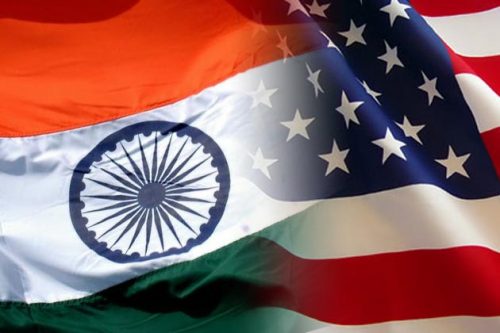
Kugelman, the Deputy Director of the Asia Program at Wilson Center, speaks to Frank Islam.
Michael Kugelman, the Deputy Director of the Asia Program and Senior Associate for South Asia at the Wilson Center in Washington, DC, is a prominent expert on India, Pakistan and Afghanistan. He has edited or co-edited 11 books, including Pakistan’s Interminable Energy Crisis: Is There Any Way Out? (Wilson Center, 2015).
In an interview with Frank Islam, he spoke about the geopolitics in South Asia, China’s global influence and US-India relations, among other issues. Here are edited excerpts:
Why is South Asia so significant to American people?

South Asia is a critical region that I think that Washington tends to forget about. If you look at the geography of South Asia, it’s essentially the gateway to the Middle East and to East Asia — two critical regions of the world. What else is in South Asia? Well, there’s Afghanistan, where the United States has been fighting a war for 17 years. It’s also, of course, where India is — which is a critical strategic partner for the United States.
Then you’ve got Pakistan. So, you got a lot of different types of challenges in the region. That’s for sure when it comes to South Asia.
Tell us a little about Afghanistan. Do you think we can get out of there? What’s our game plan?
I think part of the problem is there is no game plan. I think that the US government, and not just the current administration but previous ones [as well], haven’t really known why they’re still fighting in Afghanistan. The original goal, let’s remember, was to eliminate the Al Qaeda sanctuaries. That had been accomplished.
What about the peace they’re trying to accomplish between Pakistan as well as in Afghanistan?
The objective for the Trump administration is to try to get the Taliban, which is leading this war, to stop fighting. The problem is the Taliban has been doing so well on the battlefield it really has no incentive to step off and negotiate an end to the war.
I want shift gears, Mike. Tell us a little bit about the US-India relationship under this administration: where we are, where we are going. President Obama said that the relationship between India and the United States is one of the defining relationships. Is it still so?
 I think so I think there’s been a lot of progress. There’s a lot of momentum in this relationship, particularly on the defense and security side. But I think the economic side is where there’s been a lag, and what I like to say is that the defense partnership is the sweet spot of the relationship and the economic side is the Achilles heel. So there’s still a lot of work to do.
I think so I think there’s been a lot of progress. There’s a lot of momentum in this relationship, particularly on the defense and security side. But I think the economic side is where there’s been a lag, and what I like to say is that the defense partnership is the sweet spot of the relationship and the economic side is the Achilles heel. So there’s still a lot of work to do.
When you say economy, are you talking about the trade, investment, commerce? Is that what you’re talking about? But our trade relationship with India has increased significantly.
It has, absolutely. But given the importance the United States invested in this partnership, I think there’s a concern, here in Washington, that it really could stand to strengthen a bit more on the economic side, particularly over the last year, with this Trump administration in power.
What’s your thought on the trade and tariff?
I think the administration’s policies have been very problematic…
Counter productive?
Very counterproductive, particularly in the context of India, because some of these tariffs [the United States has levied], manufacturing tariffs, steel tariffs, they really could have a very direct impact on India. And you don’t want, what you describe as a critical partner in Asia, to be affected negatively in that way through these tariff policies.
What about the fact that the United States is putting a lot of pressure on India not to buy oil from Iran. Why are they doing that? It’s going to affect India because India has been recipient of Iranian oil for a long, long time.
I would argue that this issue with India’s oil imports from Iran and how the US doesn’t want [India to buy Iranian oil], it’s one of the sore points in the US-India relationship right now. The Trump administration takes a very singularly negative view toward Iran and it doesn’t want countries doing business with Iran, even key partners like India. Iran is a key energy partner for India. It’s unrealistic.
What’s clear about the Trump administration is that it recognizes that its relationship with India is important. I think that even the Trump administration realizes that it would be unrealistic to expect India to reduce, or to eliminate all of its oil imports from Iran.
It seems to me that’s it’s a wrong approach [for the United States] to pressure India not to buy oil from Iran. Where do they get their oil [from]?
India has a pretty large supply of energy suppliers. It gets oil and gas from a variety of places. But again Iran is, or has been one of its top suppliers over the last few years. So it would be very difficult for it to compensate for such a large loss.
Shed some light on US-Pakistan and India-Pakistan relations… where we are, where we going. Do you see a brighter horizon under Prime Minister [Imran Khan], especially the relationship between India and Pakistan?
I’m not very optimistic… The new prime minister of Pakistan is a big name, Imran Khan. He’s a former cricket star.
And he brings the star power…
Yes, exactly. And he’s got a lot of cricket friends in India. He knows these guys. He came to power… speaking in a very conciliatory fashion about India. However, I think the baggage and the mistrust in the relationship got the better of him, so to speak. And I think that relationship has really been set back, and for one reason, being Imran Khan is very close to the military in Pakistan, which is a very powerful actor and is very mistrusted by the Indians. So it’s going be difficult.
But the fact of the matter is Imran Khan is a fresh face, and he’s well known in India. He’s a cricket player and doesn’t have that kind of baggage that Nawaz Sharif had, the Bhutto family had, Pervez Musharraf had. He would like to extend his hand and his heart, I would hope, and to India to work together. And it is in India’s interest to make sure that Pakistan is secure and stable.
That’s what you would think, and that’s what you would hope. And I think that Imran Khan is genuinely interested in making the relationship with India work…
So the [Pakistani] military is putting a pressure on him?
And also, you have to look at the Indian side as well. I’m not sure India’s ready. India has an election, as you know coming up early next year. [Editor’s note: the interview was recorded late last year.]
And they always bash Pakistan to get the vote
And it doesn’t play well politically for the Indian prime minister to extend a hand to Pakistan during campaign season.
I want to talk a little about China. China is making a major play, especially in South China Sea. What do you think they’re trying to do? And what should we do?
I think [with] China it’s very simple: it’s trying to deepen its global footprint, it’s trying to expand its influence…
It’s trying to do it in Africa…
Africa, Latin America, you name it, they’re there. And I think that this is concerning for the United States.
So why are we not doing anything about it, while we are [waging a trade war] with China, against whom we have a large trade deficit right now?
The Trump administration has taken a very critical position toward China and it’s telling that the administration came out with a national security strategy [in] December [2017]. It describes strategic rivalry [with China] as the biggest national security threat facing the United States. The US considers China to be a big strategic rival. So that suggests that the United States views China as a very clear.
China has already risen. It is better for the United States, it seems to me, to work together.
Absolutely, in an ideal world. But we’re looking at a different type of administration now here in Washington than we’ve had previously. It simply doesn’t seem interested in trying to find common ground with China.
You can stand on your ground, buty you can find a common ground. Especially with tariffs, we are going to be paying for this right…
Oh, absolutely. It’s all going to come back to hurt, it could come back to haunt us.
The customer… I am not what are you getting out of it.
I just don’t see this policy, this confrontational policy that the Trump administration is taking toward China, as a very reasonable one to take. But again this is an administration that has very singularly critical and even hostile positions towards certain countries, and I think China is one of them.
Have we been losing in global leadership we had under the previous administrations? Are we isolated pretty in the world scene?
I don’t know we are isolated, but we getting there. And you look at the type of responses coming from even our former partners, NATO partners, defense treaty partners in Asia.
Where we are going? We basically have been a beacon of democracy and hope and inspiration for many, many generations, for many, many years. This is who we are.
I think there’s been a revolution in world affairs since the Trump administration came into power, and it’s been a very interesting revolution in which everything that we took to be true in world affairs for the last few decades has been thrown out the window: key alliances, partners —it’s all come into question. And that certainly will have consequences far beyond whenever the Trump administration ends.
When it ends, do you think we can repair the damage?
I think it certainly is repairable. One could argue that in certain levels, particularly in terms of key partnerships with allies in Europe and Asia, the damage is done. And it’ll take a long time. But nothing is irreversible, when it comes to international affairs.
How do you see the relationship between United States and South Asia? What do we need to make sure we can repair the damage, to make sure we are the global leaders militarily and economically?
I think that when it comes to South Asia, it’s a bit simpler. The United States needs to work out its disagreements with India. India is a critical partner, given that — we were talking about China — the US and India very much see eye to eye on China. They both worry about its rising influence. You’re right, it’s already risen, but its influence continues to increase. The US needs to get that relations…
They need to contain China?
I don’t know if I like the word “contain,” but perhaps push back, as a more diplomatic term, because you can’t really contain China. It’s too powerful for that. It’s building this huge Belt and Road initiative across the world, this huge connectivity infrastructure project, and that’s going places. So you can’t really contain China, but there’re ways of trying to come up with other types of policies to compete with China and make it a bit more difficult for China to be the only, the sole economic heavyweight so to speak.
What about the China-Pakistan corridor that’s happening right now? Do you think India has to worry about that? Or India could be part of that?
I think if the political relations between India and Pakistan, and India and China were better, India may want to be a part of it. But I think that India is just very worried — India always worries — that China is trying to encircle India by you know engaging in these investments and infrastructure projects around South Asia, right in India’s backyard. And I think that, for India, this China-Pakistan economic corridor essentially cements this notion of India being encircled. This is India’s perspective.
Is that your perspective as well?
No, I don’t think so. Certainly, China is very present in India’s backyard, but whether it’s seriously trying to encircle India, I think, that sort of takes things a bit far.
Pakistan didn’t have too many choices. Its relationship India is not going anywhere, the relationship with the United States is in a very difficult trajectory and path. It’s not moving forward. So their choices are limited. So China is probably the place that they need to go to.
Yes, let’s face it. Pakistan needs friends. Its relationship with the US is very much on the rocks. So it looks to countries like China. But it’s also trying to increase its relations with other players — Russia Turkey.
Also the Gulf countries…
Exactly, particularly the Saudis, which has been a long-standing relationship.



